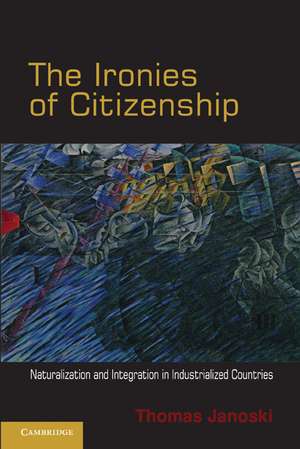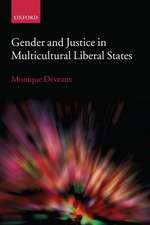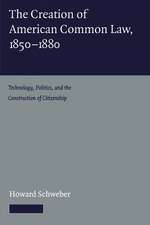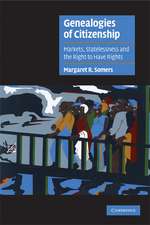The Ironies of Citizenship: Naturalization and Integration in Industrialized Countries
Autor Thomas Janoskien Limba Engleză Paperback – 22 aug 2010
| Toate formatele și edițiile | Preț | Express |
|---|---|---|
| Paperback (1) | 264.56 lei 6-8 săpt. | |
| Cambridge University Press – 22 aug 2010 | 264.56 lei 6-8 săpt. | |
| Hardback (1) | 490.27 lei 6-8 săpt. | |
| Cambridge University Press – 22 aug 2010 | 490.27 lei 6-8 săpt. |
Preț: 264.56 lei
Nou
Puncte Express: 397
Preț estimativ în valută:
50.62€ • 52.85$ • 41.90£
50.62€ • 52.85$ • 41.90£
Carte tipărită la comandă
Livrare economică 04-18 aprilie
Preluare comenzi: 021 569.72.76
Specificații
ISBN-13: 9780521145411
ISBN-10: 0521145414
Pagini: 352
Ilustrații: 5 b/w illus. 28 tables
Dimensiuni: 155 x 228 x 19 mm
Greutate: 0.47 kg
Editura: Cambridge University Press
Colecția Cambridge University Press
Locul publicării:New York, United States
ISBN-10: 0521145414
Pagini: 352
Ilustrații: 5 b/w illus. 28 tables
Dimensiuni: 155 x 228 x 19 mm
Greutate: 0.47 kg
Editura: Cambridge University Press
Colecția Cambridge University Press
Locul publicării:New York, United States
Cuprins
1. Introduction: the politics of granting citizenship; 2. Wide measures with synthetic and dynamic methods; Part I. The Colonizers and Settlers: 3. Colonization in reverse: the degrees of empire in the UK and France; 4. From manifest destiny to multi-culturalism in the settler countries; Part II. Matched Case Studies and Exceptions: 5. European colonizer versus short term occupier: Austria and Germany; 6. World colonizer versus late occupier: The Netherlands and Belgium; 7. Left and green politics trump regime types in Nordic countries; Part III. The Comprehensive Analysis of Naturalization Rates: 8. Explaining naturalization rates in eighteen countries: regimes over centuries and politics and institutions over decades; 9. Conclusion - explanations and future of citizenship.
Recenzii
“The Ironies of Citizenship brings together an unprecedented wealth of information on citizenship that spans more than three decades and 18 countries. Janoski uses his impressive store of legal knowledge and naturalization statistics to forcefully argue that contemporary politics and historical experiences, especially of colonialism, are the driving forces behind immigrants’ formal political membership today. An important, empirically-grounded addition to current debates about immigrant citizenship.”
—Irene Bloemraad, University of California, Berkeley
“This beautifully written and meticulously documented volume by a brilliant scholar with a stellar record of comparative social research contributes significantly to our understanding of naturalization. It builds on numerous case studies to provide a comprehensive review of historical and contemporary factors that shape various nations’ approaches to naturalization and then applies sophisticated statistical techniques to test major theories on the topic. In this, Professor Janoski reveals his unique ability to weave together both historical and quantitative methods in a succinct, theoretically refined, and highly original manner.”
—Steven Gold, Michigan State University
“Tom Janoski’s new book brings the rigor of causal analysis and the depth of historical-comparative sociology to the usually descriptive and legalistic study of nationality laws. In an impressive comparison of eighteen countries, The Ironies of Citizenship tells us why some countries hand out citizenship to foreigners easily while others are reluctant, and what accounts for change over time. This is a milestone in the comparative study of citizenship.”
—Christian Joppke, The American University of Paris
“Thomas Janoski’s The Ironies of Citizenship is a comprehensive examination of differences in the dynamics of naturalization across the advanced industrial societies. Based on years of in-depth comparative research, Janoski addresses an impressive range of interconnected theoretical issues, buttressing his conclusions with an array of historical and quantitative evidence. Very few comparative projects combine this breadth and depth.”
—Charles Ragin, University of Arizona
“In this impressive work, Thomas Janoski dares to take up Charles Tilly’s admonition for comparative historical sociologists to make ‘huge comparisons of big structures and large processes,’ and investigates the determinants of naturalization rates of contemporary advanced capitalist democracies over the sweep of four centuries in five comparative historical analyses. The Ironies of Citizenship represents the finest in macro-comparative political sociology. It is essential reading for comparative political sociologists and comparative political scientists regardless of sub-field.”
—John D. Stephens, University of North Carolina, Chapel Hill
“To explain variations in nationality and naturalization policies, [Janoski] first elaborates a set of categories that are based on a country’s colonial/settler past. Janoski’s categories, unlike those developed by other scholars, are dynamic and developmental.” - Martin A. Schain, New York University, Comparative Politics
—Irene Bloemraad, University of California, Berkeley
“This beautifully written and meticulously documented volume by a brilliant scholar with a stellar record of comparative social research contributes significantly to our understanding of naturalization. It builds on numerous case studies to provide a comprehensive review of historical and contemporary factors that shape various nations’ approaches to naturalization and then applies sophisticated statistical techniques to test major theories on the topic. In this, Professor Janoski reveals his unique ability to weave together both historical and quantitative methods in a succinct, theoretically refined, and highly original manner.”
—Steven Gold, Michigan State University
“Tom Janoski’s new book brings the rigor of causal analysis and the depth of historical-comparative sociology to the usually descriptive and legalistic study of nationality laws. In an impressive comparison of eighteen countries, The Ironies of Citizenship tells us why some countries hand out citizenship to foreigners easily while others are reluctant, and what accounts for change over time. This is a milestone in the comparative study of citizenship.”
—Christian Joppke, The American University of Paris
“Thomas Janoski’s The Ironies of Citizenship is a comprehensive examination of differences in the dynamics of naturalization across the advanced industrial societies. Based on years of in-depth comparative research, Janoski addresses an impressive range of interconnected theoretical issues, buttressing his conclusions with an array of historical and quantitative evidence. Very few comparative projects combine this breadth and depth.”
—Charles Ragin, University of Arizona
“In this impressive work, Thomas Janoski dares to take up Charles Tilly’s admonition for comparative historical sociologists to make ‘huge comparisons of big structures and large processes,’ and investigates the determinants of naturalization rates of contemporary advanced capitalist democracies over the sweep of four centuries in five comparative historical analyses. The Ironies of Citizenship represents the finest in macro-comparative political sociology. It is essential reading for comparative political sociologists and comparative political scientists regardless of sub-field.”
—John D. Stephens, University of North Carolina, Chapel Hill
“To explain variations in nationality and naturalization policies, [Janoski] first elaborates a set of categories that are based on a country’s colonial/settler past. Janoski’s categories, unlike those developed by other scholars, are dynamic and developmental.” - Martin A. Schain, New York University, Comparative Politics
Notă biografică
Descriere
What causes some countries to naturalize large numbers of foreigners, while others keep them at arm's length?














